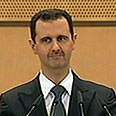
Has greater concerns. Assad
צילום: AFP PHOTO/SYRIAN TV
Don’t count on the Arabs
With Arab rulers preoccupied with domestic affairs, Palestinian issue now takes backseat
Part 2 of analysis
Even though Jordan has no official principled reason to object to a Palestinian declaration of statehood, officials in the kingdom may fear such unilateral steps more than anyone else. In Jordan’s view, such moves may quickly escalate the situation and make the Jordanians pay a heavy price as result of the high number of Palestinian refugees in the kingdom.
Meanwhile, Syrian President Bashar Assad has much greater concerns than a Palestinian declaration of statehood. Moreover, Assad is apparently eager to divert the global media attention away from events in Syria. Hence, as far as he is concerned, he would surely aspire for renewed Israeli-Palestinian hostilities and a confrontation that would remind everyone who the “bad guy” is in the Middle East. In any case, Assad will not be the one to convince Mahmoud Abbas to forego the statehood initiative.
And what about Hassan Nasrallah in Lebanon? In a recent speech he delivered, it turned out that nothing has changed. “What did Obama’s and Netanyahu’s speeches leave for the Palestinians? Obama voiced his objection to a unilateral declaration. He spoke about a demilitarized Palestinian state and the 1967 borders, and two days later changed his mind. After everything Netanyahu said, what precisely will he be negotiating with the Palestinians for?”
According to the Hezbollah leader, “events of the last decades proved that the proper, realistic and logical choice is choosing armed popular resistance, which achieves its goals.” His position is not surprising, and we are dealing here with one of the strongest men in Lebanon, which is a member of the UN Security Council.
Elsewhere, Saudi Arabia is wholly preoccupied with a battle of retreat in the Middle East. The royal house invested immense efforts to safeguard Bahrain, its backyard, for fear of Iranian takeover. Saudi forces along with Gulf troops are operating in the area, and the Saudi royal house is investing exceptional efforts and managing almost on its own – without the US and the European Union – the battle of Mideast rulers against the upheaval.
In the face of the smoldering regional chess board, a Saudi call for Palestinian flexibility and return to talks with Israel appears unreasonable. With that in mind, the Saudi position may change in line with developments in other fronts.
The Mideast as a whole is immersed in battles of survival and adjustment. Despite the recommended caution in respect to regional predictions it appears that at this time nobody has an interest in or desire to convince Abbas to forego the September declaration. Diplomatic initiatives on the part of Arab states are also not expected in the foreseeable future, especially given the fact that even arranging an Arab League meeting has turned into a complex task.
The Middle East is withdrawing, with each leader preoccupied with his own affairs. A statesman who may influence Abbas and the Palestinians may be found, if at all, in other theaters.
- Follow Ynetnews on Facebook










